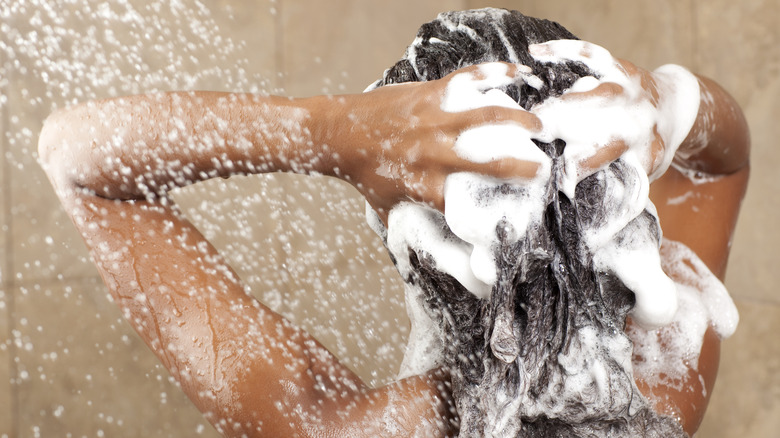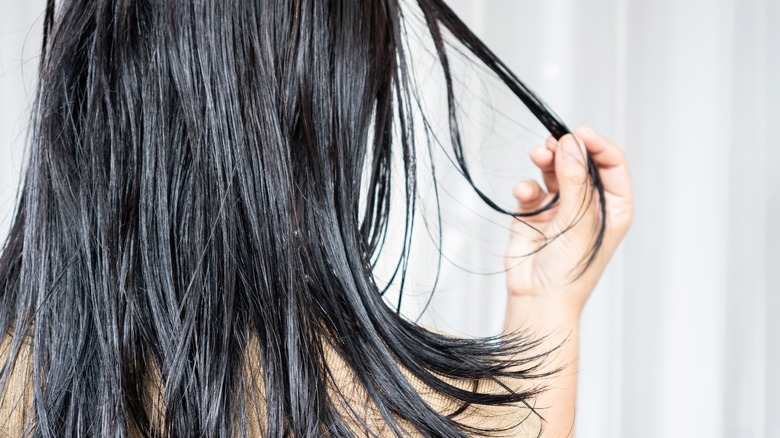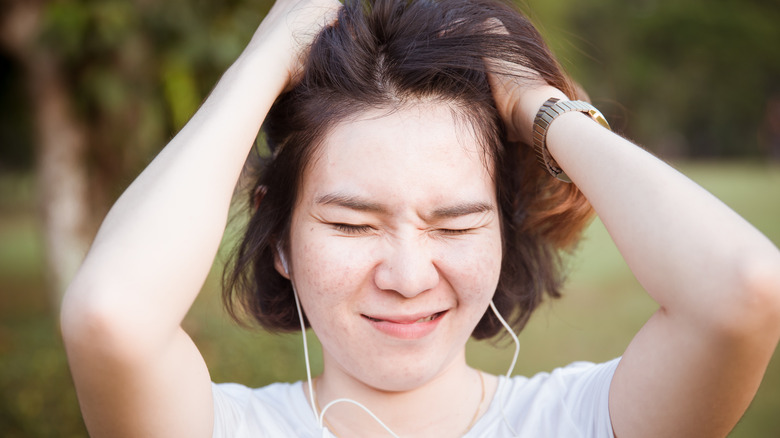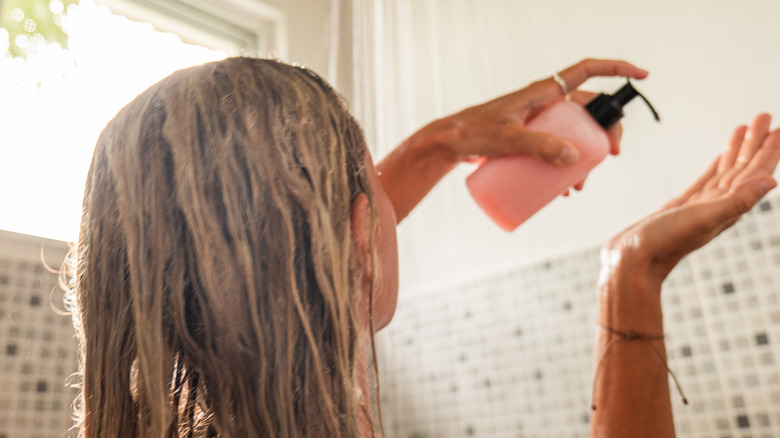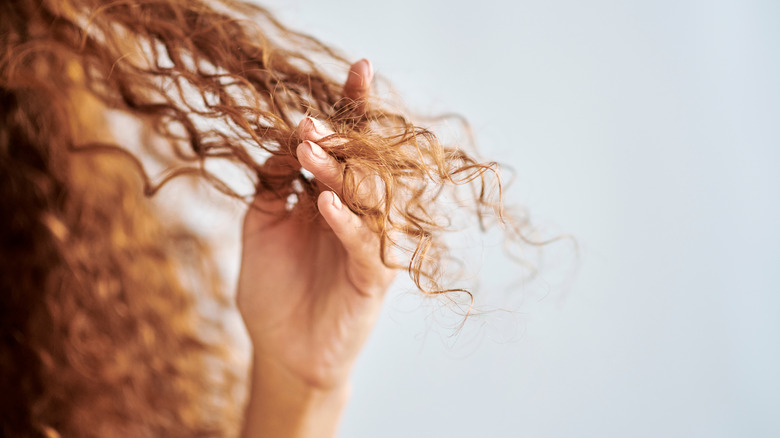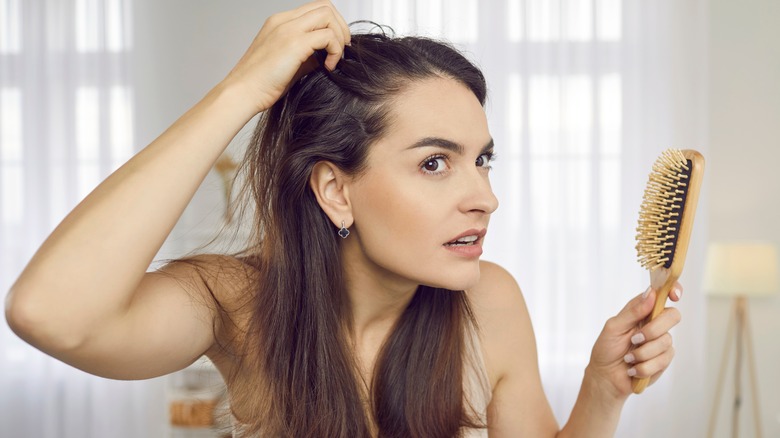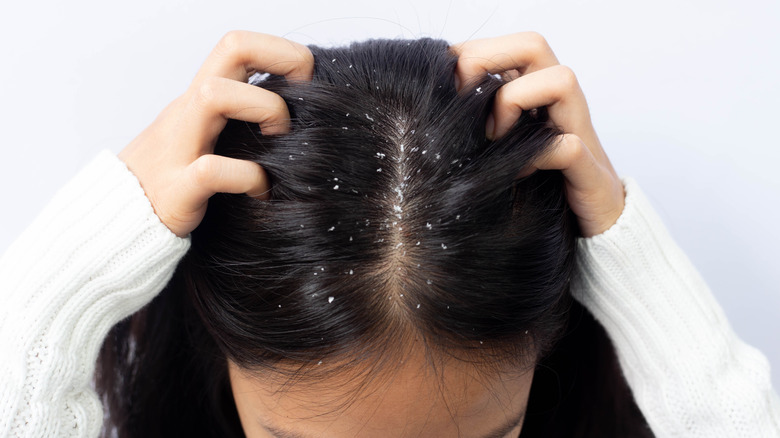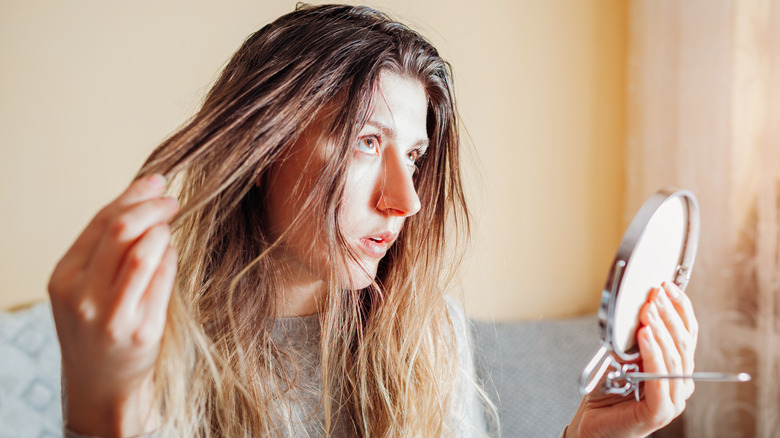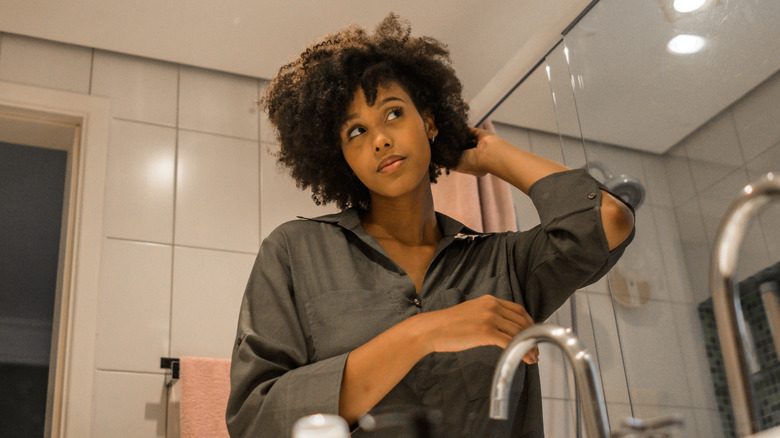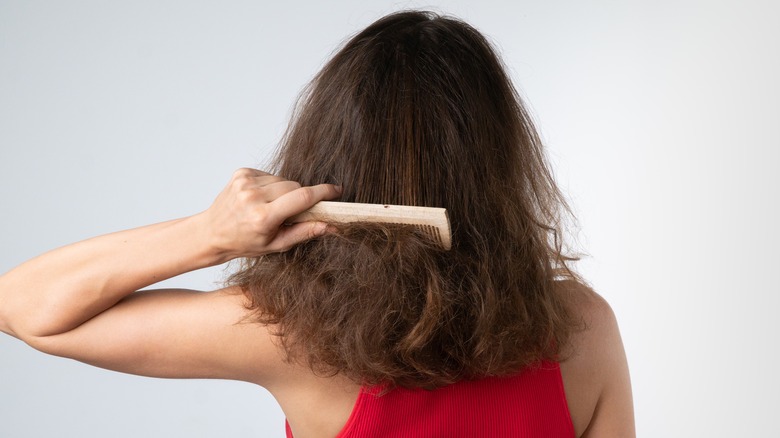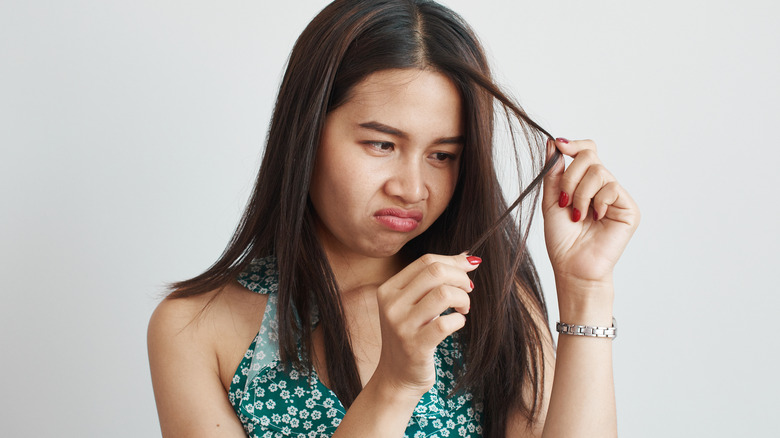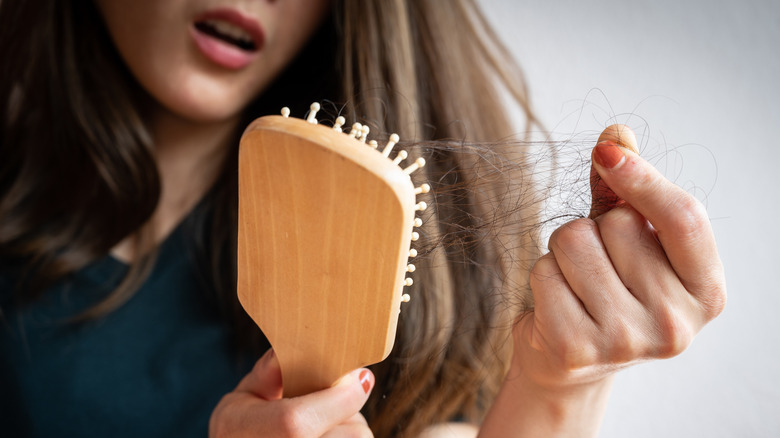11 Signs Your Shampoo & Conditioner Aren't Doing Their Job
We know, we know — there's more to having great hair than just the shampoo and conditioner you use, but it turns out, what you use to lather up your locks may have more of an effect on the finished product than you might think. "Good hair days start on wash day. If you don't get a strong start with your shampoo and conditioner routine, styling will present one challenge after another ... " hairstylist Quia Querisma explained to Well + Good.
You'll already know that there's a huge number of different shampoos and conditioners on the market, all of which are created to tackle different hair problems. From protecting color to taming unruly locks and far beyond, there really is something for everyone — but that's exactly why some products are not made for everyone. Yep, even if you have limp locks and you purchase a product intended to create volume, that still doesn't mean every shampoo or conditioner on the market claiming to tackle your hair issue will actually work for you. "The biggest mistake clients run into with shampoo is not using the proper product targeted for their specific hair type," hairstylist Bianca Hillier said to Byrdie. But how exactly do you know what's for you and what isn't? Well, there are a few telltale signs that will indicate what works for you — and what doesn't — when it comes to washing your locks.
You can't shake off those extra oily locks
Some of us just have naturally more oily scalps than others, but if increasingly greasy hair is something you've found to be more of an issue since you started using something different on your locks, it could be because of your haircare products. BosleyMD-certified trichologist Gretchen Friese explained the process to InStyle, revealing that there are certain shampoos that can change your hair's natural pH and cause it to produce more oil. That can then cause a vicious cycle of more frequent washing with the wrong product, which, in turn, only makes your hair produce more oils. "If someone is experiencing these issues they may want to look for a shampoo that says it is 'pH balanced.' Avoiding shampoos that contain sulfates is also key in keeping a balance, as they can be very drying to the scalp and hair," Friese shared.
In this instance, one of the best ways to get your shampoo on your side is by adding an extra step to your haircare routine. "Use a clarifying shampoo a couple times a month to remove hard water deposits and product build up. Your hair will feel fresh and extra clean!" Guy Tang, celebrity stylist and My Identity founder, recommended to Huda Beauty.
There's redness or irritation on your scalp
As with anything we put on our skin, there's a chance for it to cause irritation or redness — and shampoo and conditioner are no different. Though you might think haircare products don't affect us as much as things like moisturizers or makeup – because they're only on our skin for a few seconds before being washed off — you'd be very much mistaken. Shampoos and conditioners still very much have the ability to bother your scalp, which can cause a number of symptoms including irritation, redness, or extra itchiness. You may not even know right away if this is actually happening to you, as it can sometimes take years of buildup to learn that you're allergic to your hair products. Amongst the ingredients to look out for? A 2006 study found that there are a number of ingredients in shampoo that people are most likely to be allergic to, including Sodium Lauryl Sulfate, Sodium Laureth Sulfate, Cocamidopropyl Betaine, Ammonium Lauryl Sulfate, Sodium Myreth Sulfate, and Sodium Lauroamphoacetate.
If you're worried your shampoo or conditioner is doing you more harm than good, always stop using it immediately. We'd then recommend visiting a doctor for a patch test, which will confirm if there are any ingredients in the product that are irritating your skin. This would indicate that you should avoid those ingredients going forward.
Your hair color fades fast
For those who get their hair colored, you may notice that if you're using a shampoo and conditioner that aren't working for you, your freshly dyed locks don't stay as colorful for as long as you'd like. Instead, your once bright and shiny locks start fading fast. Guy Tang explained to Huda Beauty that anyone who regularly has their tresses dyed will need to use color-prolonging hair products — with a focus on ones that suit their particular scalp. "Shampoos designed for colored hair are formulated with gentle cleansing ingredients to ensure that the shampoo does not strip your color," he said. If your shampoo contains sulfates , that can be one of the absolute worst offenders when it comes to dulling your color.
You may find yourself with multiple needs that your shampoo or conditioner just can't tackle on their own — for example, you may have colored hair that's also frizzy and needs more moisture. In this case, it may be a good idea to use various products interchangeably, depending on your needs that day. "Wash hair about three to four times a week with the correct shampoo and a conditioner/mask made for color-treated hair. And, in between washes, refresh your hair with a dry shampoo of your choice," celebrity stylist Tonya Le suggested to Insider.
Dry hair and breakages are taking over
As well as the obvious cleaning benefits, shampoos and conditioners should work to keep your hair healthy and moisturized — not dry and brittle. That's why dry locks may be a sign that it's time to invest in a new in-shower duo. Celebrity hairstylist Linet K told Well + Good that if your hair is dry or brittle, "it may mean your shampoo is too harsh and you need to switch to one that's more moisturizing." You can try to combat this with a richer conditioner, but your best bet is to switch to a shampoo that's less likely to strip your locks. Of course, there are a few other reasons why your hair may be dry and damaged – including too much heat — but changing your products is a good first step to see if that fixes (or at least helps) the issue.
Getting a shampoo and conditioner that moisturizes properly and doesn't have any negative effects can be a balancing act, so there are a few things to know. "Truly exceptional formulations have a balance between moisturizing agents and proteins. If you go too heavy on a protein, that will cause breakage. Put in too many moisturizing agents, that'll cause breakage, too," CEO and co-founder of Soapbox, Dave Simnick, told Insider. "Getting the balance just right though will produce silky, moisturized, healthy hair."
Lots of limp locks
Another sign that your shampoo and conditioner need to be swapped out? Your locks are feeling totally limp and devoid of any volume. After all, a good blow-dry after a fresh wash should give your hair more body than before you primped it — even if you have naturally thin hair.
But if you've done all that you can to achieve some volume and texture — including using things like mousse and a round brush during a blow-dry — and you're still not getting the results you want, try using a new shampoo and conditioner. "When your hair feels lifeless and limp after a fresh wash is a sign you need to replace your shampoo," hairstylist Michelle Cleveland told Well + Good.
Cleveland advises that, in the warmer months of the year, you should use a shampoo that can help remove any buildup, and in the colder months, opt for something more nourishing given that your scalp can become dry more easily at this point in time.
You have dandruff
There are a number of reasons dandruff may occur on your scalp, including oil buildup or skin conditions, but the wrong shampoo and conditioner could also be the culprit. For some people, dandruff can be the result of a dry scalp, which could easily be exasperated, or even caused by, shampoo or conditioner that's just far too drying for your skin. "A total lack of moisture from stripping oils can ... cause a dry, flaky scalp and as your scalp dries out, so does your hair," celebrity stylist Tonya Le revealed while speaking to Insider about the common hair condition.
Unfortunately, there isn't a way to totally cure dandruff, but, as dermatologist Dr. Amy McMichael told Everyday Health, "You can prevent the signs and symptoms." The first step to take is shampooing your hair every day, in order to help remove skin segments from your strands. Also, make sure to swap out the product that's causing your scalp issues for something much gentler. You can then combine that with a specific cleanser designed to combat the issue.
That clean feeling is gone instantly
Let's be honest. There's almost nothing better than giving your hair a really good wash and style, then running your hands through it to feel it at its silky soft best — but that's not always the case. For some people, even immediately after a wash, there can be a waxy buildup on the locks that makes it feel instantly dirty again. If that sounds like you, this could be a sign that your shampoo and conditioner aren't working for you anymore. "A good sign that your shampoo has stopped working is when you still feel build-up after freshly washing your hair. This means your shampoo has stopped benefitting your specific needs," celebrity hairstylist Michelle Cleveland told Well + Good. Tonya Le shared a similar take while chatting with Insider, noting that using too much of a certain shampoo can also cause this undesired buildup, which may mean you could benefit from using something else in its place.
But don't just blame it on the shampoo. That waxy, gross feeling can often be left there by a conditioner that's just too heavy for your tresses. To combat it, you'll want to swap to something a little lighter (look for something that describes itself as being lightweight on the label) so that it's less likely to leave that somewhat sticky residue behind.
You've gone through some changes
You may also find your shampoo and conditioner have stopped working like they used to because your own circumstances have changed. It's a myth that beauty products will stop doing their job because your skin gets used to them, but it is true that changes in your hair or body can have an effect on how well they work. "If your shampoo stops giving you the results you want, the condition and needs of your hair have most likely changed, or the season may have changed — it's more humid, the sun is stronger, or the air is dryer," celebrity hairstylist Cynthia Alvarez explained to Marie Claire (via Cosmopolitan UK). Alvarez added that there are a few things that can impact the effectiveness of your hair products, with several factors, including illness and your menstrual cycle, playing a part in diminishing the success of your haircare products.
So, if your body has recently gone through a few big changes, that could be a sign you need to change things up when you wash your tresses during that period of time. Having various shampoos and conditioners as options for your different needs is probably a good idea.
Knots galore live in your locks
Another sign you need to change up your shampoo and conditioner is if your hair is extra prone to knots. Conditioner should be working to moisturize your hair after the shampoo does the cleaning part, but many tangles can form because your hair isn't being moisturized enough. So, if your products aren't at least helping to smooth out those pesky knots, it's time to throw that empty beauty bottle into the recycling. One thing you can do on the conditioning front is swap out your in-shower product for a richer leave-in conditioner. "The right leave-in conditioner will help to moisturize and repair your hair," celebrity colorist and extension expert Meri Kate O'Connor explained to Ipsy.
Knots can also often be caused by frizz, which is also sometimes the result of a conditioner not providing enough moisture. The frizzier your hair is, the heavier conditioner you need, so it may be time to switch to something a little more potent. Another technique you could try? Washing your hair with conditioner only, which is a technique known as co-washing. It may sound like a foreign concept to some, but ditching the shampoo is actually recommended for those with super dry locks. "Co-washing — or, conditioner washing — allows the gentler cleansing without the drying detergents that can harm the scalp and hair," hairstylist Miko Branch told MBGLifestyle. "Co-washing protects the integrity and strength of the hair while maintaining its natural oils."
There's little to no shine in your hair
Has your hair lost its shine? This could be another sign that you need to do figure out which hair products do and don't work for you. "Shiny hair is healthy hair, so if your hair has no shine, it could mean your hair is not moisturized," stylist Tonya Le revealed while speaking to Insider. "Shampoo washes away your natural oils, leaving the inner layer unprotected," she added. So, if you use a lot of heat tools on your hair immediately after washing it, it may be time to invest in a shampoo or conditioner that doesn't exacerbate any damage.
Negative effects like this could also suggest that the shampoo and conditioner you're using just aren't compatible together. You can use a shampoo from one company and a conditioner from another, so long as they work well for your hair. Though, there's usually a reason for companies to include specific shampoos and conditioners in the same range — it's because they're designed to complement each other. If your locks just aren't getting the right benefits from products of different ranges, it may be time to try buying from the same brand.
Your hair is looking far less thick
There are a wide range of reasons why your hair is thinning — including diet, illness, or hereditary reasons — but the wrong shampoo and conditioner can certainly cause hair loss too. If you're noticing things like extra hair on your pillow, in the shower drain, or in your brush, one of the first things you can do to combat hair loss is change your shampoo and conditioner. In fact, if your hair products are drying out your hair or scalp and not giving it the moisture it needs to stay thick and strong, it can actually make it look a lot less thick. To combat this, there are plenty of hair brands that offer shampoos and conditioners designed to create volume, which will help you better style your hair to make it look thicker.
But if hair loss and thinning hair are things you're feeling self-conscious about, you may want to trade in your usual in-shower hair products completely and go for something medicated — or choose items from a range specifically designed for hair loss.
